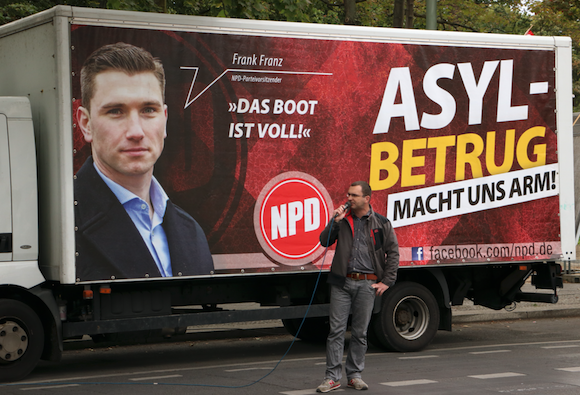The German government’s use of the largely unregulated private security sector in the reception and care of asylum seekers has led to neo-Nazis having unrestricted access to the very people they want to harm.

Rene S. was an active member of the neo-Nazi organisation ‘Sturm 18’, with a criminal record, yet in 2015, he was hired as a security guard to protect asylum seekers in Heidelberg. Phillip S. participated in a NPD rally against asylum seekers outside a refugee reception centre in Heidenau, Saxony, just months before being hired by the private security provider Securitas to protect the asylum seekers inside it.[1] These are not isolated cases and they are not new; the link between private security companies and neo-Nazis and the violence and racism of employees within the security industry has been documented by the media for years; and yet is rarely taken seriously by the government.[2] Nor is it surprising; according to a Secret Service estimate, one in ten neo-Nazis known to the intelligence services in the state of Brandenburg are employed in the private security industry.[3] This is not simply a case of occasional negligence or incompetence of an over-stretched state and the respective municipalities struggling to cope with the growing number of asylum seekers. Rather, it is an inevitable outcome of outsourcing care to a largely unregulated and highly volatile private security sector.
In late 2014, Germany was shocked by footage from a refugee welcome centre in Burbach, which showed a private security guard standing on the head of an asylum seeker, and, in another video, forcing him to lie on a mattress covered in his own vomit. The media reported widely on this scandal, as it has done on numerous other cases of violence against refugees.[4] Yet, over a year later, a court date has still not been set for the trial of the guard.The media has also covered the 222 arson attacks on refugee reception centres in 2015,[5] of which only four, to date, have ended in convictions – but the relationship between neo-Nazi violence inside and outside the centres has not been fully explored, any more than the lack of justice for its victims. Not only does the increased privatisation of asylum care actively put the lives of asylum seekers at risk, it also allows the state to absolve itself of responsibility and fails to ensure accountability and justice for the abuses that are committed against asylum seekers.
According to Volker Eick, a political scientist based in Berlin who works with the progressive lawyers’ association Republikanischer Anwältinnen – und Anwälteverein, private security companies, while contracted to do the job of the state, allows the authorities to deflect any direct responsibility for violence or ill-treatment of refugees. Outsourcing the management, and particularly, the security of refugees to for-profit companies, he explains, is primarily a cost-cutting measure.[6] Police officers with three years of training are much more expensive than by and large untrained ‘rent-a-cops’ with a salary hardly above (or even below) the minimum wage of €8.50/hour. While police officers are not perfect, at least their failures ‘can be criticised, measured and sanctioned’.[7]
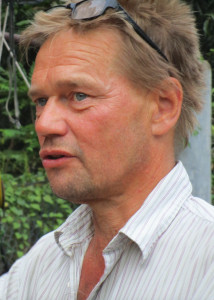
Security at refugee reception centres in every German state other than Bavaria is sub-contracted to private security companies. Even at centres managed by non-profit organisations (NGOs) such as the Red Cross, security is sub-contracted to the lowest bidder. These companies are not governed by the laws but through industrial codes,[8] and are under the jurisdiction of the Ministry of Economic Affairs. Germany is one of only four EU member states that do not have a law regulating private security.[9] The only requirement for the setting up of a private security company is the completion of eighty hours of training at the Chamber of Industry and Commerce and a multiple-choice test for which the pass rate is fifty per cent.[10] For employees of the security industry, this requirement falls to forty hours of training and a clean police background check (although, as numerous examples show, companies tend to be a little more lenient on the latter). As well as lacking training in general, security guards receive little additional training specific to the demands of working at a refugee reception centre. In July 2015, less than half (28/59) of the reception centres in Berlin had a handbook or strategy for training security guards.[11]
Deliberate strategy
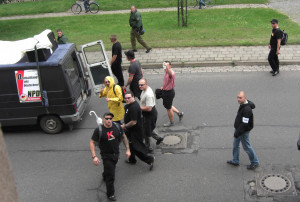
It is not surprising that the security industry, and especially the industry of policing asylum seekers, attracts neo-Nazis and members of extreme right-wing organisations.[12] First of all, there is the psychological aspect. As Eick explains, ‘there is the widespread (and not unfounded) assumption that you can behave like Crocodile Dundee if you work for a private security company … the authoritarian nature of this line of work is attractive to neo-Nazis’. Furthermore, employment as a security guard at a refugee reception centre grants direct and intimate access to asylum seekers, quite literally giving would-be attackers the keys to their victims’ doors. In its annual report in 2002, the intelligence service of Saxony-Anhalt warned of attempts by militant neo-Nazi organisations such as the citizen’s militia Selbstschutz Saxony-Anhalt (Self-protection Sachsen Anhalt, SS-SA) to seize control of the security market. The group described itself as a ‘non-commercial association of skilled persons, who in their spare time execute security and order services’ and had actively sought out security contracts over the internet.[13]
Another important factor in attracting neo-Nazis to the security sector is economic. Especially in parts of former East Germany, where unemployment rates are high and economic opportunities are limited, private security work provides employment for those with no qualifications. According to the German ‘Federal Association for Security Industries’ (Bundesverband für Sicherheitswirtschaft, BDSW), the annual turnover increased by 8.9 per cent and employment by 4.9 per cent in 2015. Dr Harald Olschock, managing director of the BDSW, explains that the increased demand for security services in asylum centres and at airports has driven these increases.[14] In rural areas, hiring is often done through personal networks, which allows for laxity in the background checks on employees. But links between neo-Nazi organisations and private security companies run deeper than the occasional hiring of an unemployed neo-Nazi nephew with a criminal record.
In 2003, for instance, an intelligence report on extreme right-wing groups in Brandenburg outlined the link between Zarnikow, a private security company dominant in the village Rathenow, and the neo-Nazi organisation Kameradschaft Hauptvolk. One employee was hired directly after release from a 5-year prison sentence for nearly killing a Bosnian migrant, and another had been convicted on weapons and criminal assault charges. Racist abuse and violence by rent-a-cops have been repeatedly reported on by the press, but not taken seriously by the state.[15] In October 2015, security guards were caught on camera chasing down and kicking a refugee in Dresden. Local news sources had repeatedly reported that their employer, Ihre Wache GMBH, was working with neo-Nazis. More recently, in mid-February 2016, the rural town of Clausnitz in Saxony provided the backdrop for a soon-to-be viral video of a hate mob blocking a bus full of refugees. A few days after the attack, several news sources alleged that the director of the reception centre where the refugees were headed is himself an active member of the anti-immigration party Alternative für Deutschland (AfD), and that his brother had played a leading role in organising the mob.[16]
The justice minister of Saxony, Geert Mackenroth, recently admitted that the shortage of qualified security personnel is so dire, due to the current high demand, that ‘dodgy’ security firms were increasingly being hired.[17] The hiring of ‘dodgy’ security firms is not a recent phenomenon, nor is it inevitable. Zarnikow, for instance, was able to retain local government security contracts thirteen years ago, because it had roots in the local area, and had held contracts for years. At the end of February 2016, a department head at the LaGeSo refugee registration centre in Berlin was arrested on suspicion of accepting bribes from a private security company for guaranteeing security contracts at refugee reception centres.[18]
State abdication of responsibility
Not only are neo-Nazis attracted to the security industry and actively seeking out work in the proximity of a vulnerable group they proclaim to hate and wish to harm, but at many levels the state and local authorities are enabling this abuse by blindly and willingly abdicating responsibility. In the Burbach case, police officers, social workers and members of local government of the Arnsberg district are being investigated for wrongful detention and coercion through neglect, because they were allegedly aware of the abuses and simply did nothing.[19]
While the government was quick to pass a new law easing the deportation of asylum seekers involved in criminal activity after the New Year’s Eve attacks in Cologne,[20] the justice system seems impotent, or just indifferent to the tenfold increase in arson attacks on refugee reception centres in 2015[21] and the increasing incidence of violence against asylum seekers by security guards.[22] In October last year, two security guards on trial for the assault and abuse of asylum seekers in a reception centre in Essen were acquitted.[23] In the same month, the security guards caught on camera chasing and beating an asylum seeker in Dresden were allowed to retain their posts; the only sanction was that they can no longer enter the rooms of asylum seekers unaccompanied. Over a year later, the scandalous and widely publicised case in Burbach is still being investigated, with no trial date in sight.
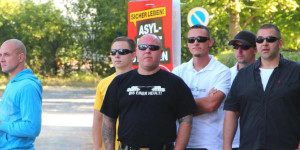
Volker Eick highlights the distinct lack of political will and institutional racism in prosecuting cases of violence against refugees, as well as a lack of resources. ‘The police are unwilling to seriously investigate cases where refugees and asylum seekers are attacked, and unwilling to prevent such attacks – they are simply not taking these cases as seriously as if they had happened to Germans.’ Nevertheless, due to the wide media coverage and the protests of human right groups, the Federal government set up a special task-force after the abuses in Burbach to investigate the current status of control mechanisms of the security industry.[24] They recommended annual checks on staff by state authorities, but Eick is reluctant to believe in any changes in the nearer future. The cost of annual checks would be enormous and this has meant that the recommendations have not been taken seriously. According to a March 2016 press release from the Federal Ministry of Economic Affairs and Energy, the government plans to make statutory exams for private security management mandatory. In future, the Public Order Offices (responsible for overseeing private security companies) will be required to cross-check private security contractors once every three years (through asking the police for statements).[25] And every three years, the ordinary staff of private security companies will also be cross-checked for reliability.[26] The fact that the corporate security industry in Germany is booming is an additional factor suggesting that the changes outlined by the Federal Ministry of Economic Affairs in its press release will not occur very soon. According to BDSW’s conservative estimate, between 5,000 and 10,000 private security guards are employed at asylum reception centres in Germany.[27] The total number of guards in Germany stands at 220,000. ‘The ministry has not provided a single hint, as to who precisely will carry out these audits – the Public Order Offices would definitely need more human resources. Nor does the ministry indicate who will pay for all this , or set out, how – within a legal framework and with respect to data protection rights – all of this will work in practice’, Eick concludes.[28]
While a lack of political will exists to control the private security industry and secure accountability for cases of violence that are reported, vast numbers of cases go unreported. There are several other obstacles to successful prosecution of abuse against asylum seekers. Eick points out the practical issues involved in reporting and prosecuting crimes against refugees. ‘Firstly, refugees who become victims of abuse are often escaping from countries where violence and torture is state-sanctioned, so they ‘might not even realise that what is being done to them is not legal in Germany’. Furthermore, there is the language barrier; they might face huge obstacles in reporting violence and abuse and might fear further abuse or deportation. Perhaps most importantly, asylum seekers who might report cases or act as witnesses are ‘being abused by the same people who are supposed to be protecting them, and to whom they should be able to turn to report abuse. Their access to the general public and lawyers is controlled by the attackers’. In the trial against the security guards in Essen in 2015, the case was dropped against two of the accused when a key witness mysteriously disappeared.[29] Complaints against security staff of private security companies are, in many cases, not recorded in any central register by the state, as a request for information by Christopher Lauer, sitting member of the independent Pirate Party in the Berlin parliament, revealed in August 2015.[30]

While private security companies have no more right to use violence than any private individual, in practice they seem to ‘embody much of the power and privileges of the state, while bearing none of the responsibilities and limitations of democratic government’.[31] However, greater state regulation of the private security industry might not necessarily be the answer, particularly if it is not accompanied by a commitment to adequately finance training programmes that foreground issues of accountability and human rights. There is a real danger that cheap, quick-fix solutions will give the appearance of accountability but will not change the necessary control mechanisms substantially. In addition, a legal redress, e.g. a German private security law, might, in this process, increase the standing and power of private security guards by turning them into a second police force.
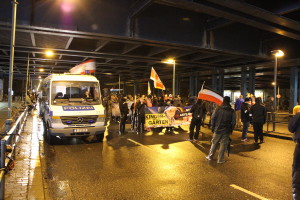
In order to avoid the emergence of a second quasi-police force with a for-profit background,[32] the German states, or Länder, have started deploying less qualified police forces. Saxony’s Ministry of the Interior, for instance, has made plans to ease the strain on the police by training 500 new ‘guard police’ officers to, among other duties, patrol asylum seekers’ camps and reception centres. After three months of training, these fast-track sheriffs will be allowed to carry firearms. As Valentin Lippman, parliamentary speaker for the Green Party in Saxony, has rightly pointed out, they will be no more than ‘a walking safety risk’.[33]
Eick argues that ‘state entities such as the police are obviously easier to control than private ones, and they do, at least, have three years of training, compared to 40 hours’. But he is also adamant that these state entities should be ‘controlled by the people’, that is to say, the state should go a step further and provide the resources to set up independent police control committees. From a human rights perspective, it is the duty of the state to protect not only their own citizens but also asylum seekers under their care. Abandoning this duty and distancing itself from responsibility by handing over the protection of these asylum seekers to the free market, driven by little more than cost, actively puts the lives of these asylum seekers at risk. Failing to secure prompt redress and accountability for abuses against asylum seekers within reception centres by those who are hired to protect them ultimately dehumanises them and devalues their lives, in the eyes of both the justice system and citizens of the country, enabling, rather than preventing neo-Nazis from gaining intimate access to those they wish to harm.
Related links
Republikanischer Anwältinnen- und Anwälteverein – Progressive Lawyers Association

